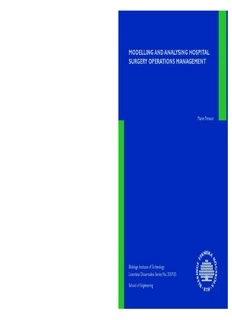Table Of ContentSM
UO
RGD
ABSTRACT ERY OELLIN
G
P
With an increasing proportion of elderly and an staff perspectives and costs. For instance, we show E A
RN
increasing demand for healthcare, managerial ef- that the current policy for resource allocation AD MODELLING AND ANALYSING HOSPITAL
T
forts are needed in order make the best use of does not handle the variability generated by the IO AN
NA SURGERY OPERATIONS MANAGEMENT
resources and to keep cost under control. One patient diagnosis very well. In Sweden a law has S MLY
S
of the most critical and expensive resources in a recently been introduced, which advocates res- ANIN
hospital is the operating theatre. This thesis aims trictions in elective patient waiting times. We ex- AGG H
EO
to investigate the potential of computer-based tend the optimisation-based approach to include M
S
EP
modelling for supporting healthcare decision ma- post-operative care and simulate a scenario based NIT
TA
kers to improve management policies related to on patient data from a Swedish hospital to be able L
the hospital operating theatre. to predict the possible impact of the new law. The
In a study conducted at a medium sized Swedish results indicate that the law causes an unsuitable
hospital we identify important prioritisations and increase in the waiting times for medium prioriti-
decisions made in relation to patient scheduling sed patients. Furthermore, we propose a combi-
Marie Persson
and resource allocation when planning for surgery. nation of discrete-event simulation and optimisa-
Patient scheduling and operating room planning tion to examine what impact different resource
are complex tasks with a number of influencing allocations of emergency and elective resources
factors to consider like, e.g., uncertainty in patient have on both utilisation rate and disturbance con-
arrival, uncertainty in surgery procedure time and sequences, i.e. surgery cancellation and overtime
medical prioritisations and diagnosis. Further, se- work, due to emergency cases and other unexpec-
veral intersected dependencies, e.g. pre- and post ted events. We show that both utilisation rate and
operative care, have to be considered as to pre- cancellation frequencies can be improved signifi-
vent occlusion and obtain a maximum patient th- cantly by the application of some minor changes in
rough-put. With an optimisation-based approach the resource allocation. Finally, we explore some
we demonstrate how different criteria in patient future possibilities of using agent technology for
scheduling and resource allocations can affect va- modelling health care management decisions.
rious objectives in terms of patient perspectives,
M
a
r
ie
P
e
r
s
s
o
n
Blekinge Institute of Technology
Licentiate Dissertation Series No. 2007:05
2
0 School of Engineering
ISSN 1650-2140 0
7
2007:05 ISBN 978-91-7295-117-4 :05
Modelling and Analysing Hospital
Surgery Operations Management
Marie Persson
Blekinge Institute of Technology Licentiate Dissertation Series
No 2007:05
ISSN 1650-2140
ISBN 978-91-7295-117-4
Modelling and Analysing Hospital
Surgery Operations Management
Marie Persson
Department of Systems and Software Engineering
School of Engineering
Blekinge Institute of Technology
SWEDEN
© 2007 Marie Persson
Department of Systems and Software Engineering
School of Engineering
Publisher: Blekinge Institute of Technology
Printed by Printfabriken, Karlskrona, Sweden 2007
ISBN 978-91-7295-117-4
To Tilde
iii
iv
Abstract
With an increasing proportion of elderly and an increasing demand for
healthcare, managerial efforts are needed in order make the best use of
resources and to keep cost under control. One of the most critical and
expensive resources in a hospital is the operating theatre. This thesis aims
to investigate the potential of computer-based modelling for supporting
healthcare decision makers to improve management policies related to the
hospital operating theatre.
In a study conducted at a medium sized Swedish hospital we
identify important prioritisations and decisions made in relation to patient
scheduling and resource allocation when planning for surgery. Patient
scheduling and operating room planning are complex tasks with a number
of influencing factors to consider like, e.g., uncertainty in patient arrival,
uncertainty in surgery procedure time and medical prioritisations and
diagnosis. Further, several intersected dependencies, e.g. pre- and post
operative care, have to be considered as to prevent occlusion and obtain a
maximum patient through-put. With an optimisation-based approach we
demonstrate how different criteria in patient scheduling and resource
allocations can affect various objectives in terms of patient perspectives,
staff perspectives and costs. For instance, we show that the current policy
for resource allocation does not handle the variability generated by the
patient diagnosis very well. In Sweden a law has recently been introduced,
which advocates restrictions in elective patient waiting times. We extend
the optimisation-based approach to include post-operative care and
simulate a scenario based on patient data from a Swedish hospital to be
able to predict the possible impact of the new law. The results indicate that
the law causes an unsuitable increase in the waiting times for medium
prioritised patients. Furthermore, we propose a combination of discrete-
event simulation and optimisation to examine what impact different
resource allocations of emergency and elective resources have on both
utilisation rate and disturbance consequences, i.e. surgery cancellation and
overtime work, due to emergency cases and other unexpected events. We
show that both utilisation rate and cancellation frequencies can be
improved significantly by the application of some minor changes in the
resource allocation. Finally, we explore some future possibilities of using
agent technology for modelling health care management decisions.
v
vi
Description:expensive resources in a hospital is the operating theatre. This thesis healthcare decision makers to improve management policies related to the.

